
 Flash News
Flash News
Requesting conditional release, Ervin Salianji arrives at the Fier Court
Fire in Lura, flames endanger the National Park
International drug search: 36-year-old arrested in Durrës (NAME)
Veliaj's appeal to be heard today in the High Court
Today's hearing at the Fier Court, Salianji requests conditional release
Budget 2025/ Part for health with a reduction in relation to total expenses

Year after year, the budget for health is growing at a lower rate than the general budget expenditures, even though the country is facing many needs for services from the aging population and the increase in the burden of diseases.
According to data from the Ministry of Finance, the budget expenditures in 2025 reach 822 billion ALL, about 8.2 billion euros, while the budget for the Ministry of Health is projected to be 80.7 billion ALL, or 9.8 percent of the total expenditures.
This year (2024), the budget of the Ministry of Health is 10.1 percent of the general budget expenditures. In 2021, health expenditures accounted for 10.7% of total expenditures.
In 2025, total expenses from the budget will increase by 6.7%, while expenses for health will increase by 3.6%.
For some other functions the increase in expenditure is twice as much as the increase in general expenditure. For example, the budget of the Ministry of Infrastructure is projected to be 15 percent higher in 2025 compared to 2024, while total budget expenditures increase by 6.7% in 2025.
Thus, wards in the country's hospital centers currently mostly treat mild symptoms of flu and fever, while hundreds of thousands of others suffering from autoimmune diseases and neoplasms are directed to be treated abroad.
The lack of medicines and diagnostic equipment makes the health links in the public sector not work.
The public health system is not meeting the demands of the population, especially with medications. Doctors advise patients with rare diseases to go abroad, as detailed analyzes are not yet done here, and medications for these diseases are not reimbursed. For example, many diagnoses of autoimmune diseases and neoplasms are now treated with innovative therapies and immunotherapies, which are not reimbursement schemes. Medicines for other rare diseases, even when they are reimbursed, are missing, often leaving even children without a cure.
Millions of euros go abroad to treat rare diseases, costing the economy and above all the health of the population. For 10 years, funds in health are often oriented towards non-efficient investments, as the reimbursement of drugs remains stagnant and investments in equipment remain low.
Public hospitals still do not have a "Pet scanner" that identifies diseases in the initial stages, while the University Center of Pristina in Kosovo also has one. For this kind of service, Albanians choose to go abroad at a time when its costs are entirely possible for the financial opportunities that the Albanian state has today./MONITOR
Latest news



Requesting conditional release, Ervin Salianji arrives at the Fier Court
2025-07-08 11:16:36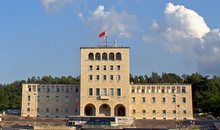
The first phase of university applications begins today
2025-07-08 11:10:52
Fire in Lura, flames endanger the National Park
2025-07-08 10:53:43
Trump warns of 35% tariffs on Serbia and 30% on Bosnia and Herzegovina
2025-07-08 10:37:32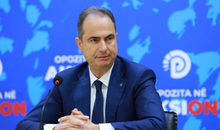
Thethi rooster and the dung cock
2025-07-08 10:24:01

Fire in Dukat endangers Llogara National Park
2025-07-08 10:01:39
International drug search: 36-year-old arrested in Durrës (NAME)
2025-07-08 09:50:48
Thethi, tourists "criticize" modern trend
2025-07-08 09:39:54
Fire on Mount Dukat still active, Llogara National Park at risk
2025-07-08 09:28:12
Veliaj's appeal to be heard today in the High Court
2025-07-08 09:16:02
"Bad sign for democracy"/ Parliament neglects reporting by institutions
2025-07-08 09:04:56
Today's hearing at the Fier Court, Salianji requests conditional release
2025-07-08 08:56:39


Horoscope, what do the stars have in store for you today?
2025-07-08 08:16:19
Weather forecast/ How temperatures will vary throughout the day
2025-07-08 08:02:37
Morning Post/ In 2 lines: What mattered yesterday in Albania
2025-07-08 07:48:30





Marrëdhënia që s’është romancë, por s’është as thjesht kolegiale
2025-07-07 21:39:13
Citizen is asked to pay 2.5 million for a non-existent meter
2025-07-07 21:28:03




What is the ideal air conditioner temperature in summer?
2025-07-07 20:53:46
GJKKO left him in prison, Meta appeals the decision
2025-07-07 20:38:05
Where is Ronaldo after missing Diogo Jota's funeral?
2025-07-07 20:38:04

Messages from the author who killed Ilaria Sulla in Rome are revealed
2025-07-07 20:20:12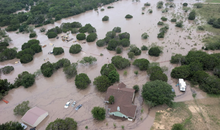
At least 91 dead in Texas floods
2025-07-07 20:12:02
Elbasan, choked by smoke, scorched by conscience
2025-07-07 19:48:16

Swarm of bees attacks citizens in France, 24 people end up in hospital
2025-07-07 19:32:03
Dementia/Hearing loss may be a warning sign
2025-07-07 19:13:06
The decision for Malltez, Gjokutaj: Boomerang for SPAK and the Court
2025-07-07 19:01:08

Former Supreme Court member acquitted of asset concealment
2025-07-07 18:36:40

WIIW expert in Politiko: Brain drain is steadily weakening the Albanian economy
2025-07-07 18:11:41
Heart health is at risk from extreme heat, here's what you should be careful of
2025-07-07 18:10:18
Today Gert Bogdani would celebrate, Edlira Çepani's touching dedication
2025-07-07 17:40:45
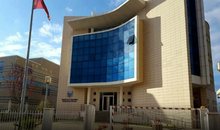





The striker severely accuses the Fenerbahce club: They tried to drug me
2025-07-07 16:21:03
A decomposed body is found in Kolonjë, initial suspicions
2025-07-07 16:03:31
Accident in Saranda, car hits motorcycle, one injured
2025-07-07 15:58:56

The most fertile age for men and women
2025-07-07 15:40:52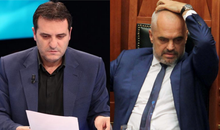
Locals, Rama candidate in 5 municipalities
2025-07-07 15:32:22
Blushi: Meta's criminal kidnapping, incomparable even to Navalny's in Russia
2025-07-07 15:20:34
Meet the iPhone 17 Pro, the main innovations in design and technology
2025-07-07 15:09:09
Why the release of Abi Malltez does not free him; much less Albania
2025-07-07 15:00:12
‘Lidhjet klienteliste’ të mjekëve mbushin recetat e pacientëve
2025-07-07 14:57:33
Poland imposes border controls with Germany and Lithuania
2025-07-07 14:48:15

Caught transporting firearms from Kosovo to Albania, young man arrested (NAME)
2025-07-07 14:37:47
Theo Hernandez flies to Saudi Arabia for medical check-ups
2025-07-07 14:26:47


Scorching heat, Greece orders mandatory work holidays
2025-07-07 13:54:25


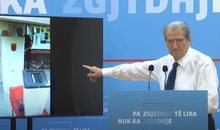

Trump expects Netanyahu to discuss Gaza ceasefire
2025-07-07 12:54:27
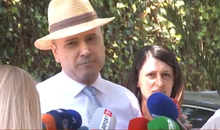
GJKKO releases Jamarbër Malltezi from house arrest
2025-07-07 12:35:02
Tourism among contrasts
2025-07-07 12:31:01
IKMT action in Theth, starts demolition of unauthorized constructions
2025-07-07 12:24:18

The Tirana-Kamëz line is destroyed by urban fire
2025-07-07 12:00:24
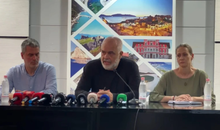

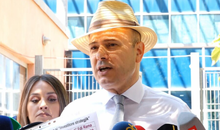

Poor direction!
2025-07-07 11:16:01


Rama to gather the country's mayors on July 9
2025-07-07 10:43:31
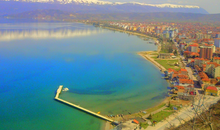
Ohrid Natural Park on the way to UNESCO's "black list"
2025-07-07 10:25:58

Registrations for the new school year begin in e-Albania
2025-07-07 09:59:09
KAS decides the "fate" of the elections in four districts of the country today
2025-07-07 09:50:51
Rama does not give up on Vlora, visits the municipality again
2025-07-07 09:39:11
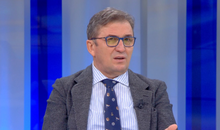

Fires in Gjirokastra, flames very close to cultural monuments
2025-07-07 09:12:49
